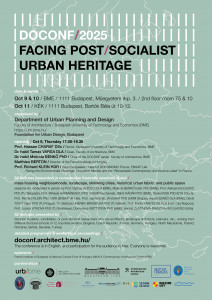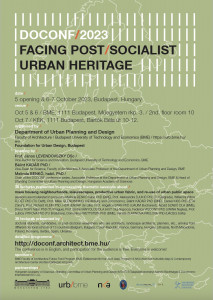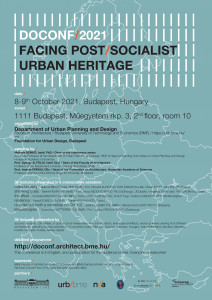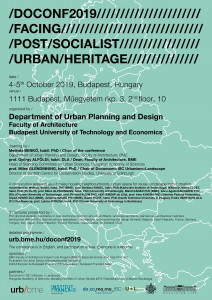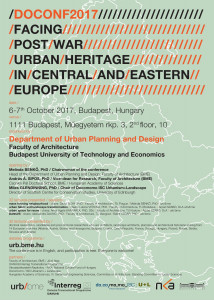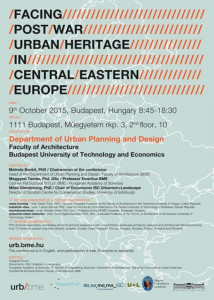9th OCT 2025 / THURSDAY 16.00- 20.00
venue: BME, 1111 Budapest, Műegyetem rkp. 3.
16.00 – 17.00 / registration and BME Faculty of Architecture guided walk for DOCONF2025 participants / 2nd. floor room 10
17.00 openings and keynote speech / open to the public! 2nd. floor room 75
Prof. Gergely ZARÁND DSc / Vice-Rector for Scientific Affairs, Budapest University of Technology and Economics, BME
Dr. habil Tamás VARGA DLA / Dean, Faculty of Architecture, BME
Dr. habil Melinda BENKŐ PhD / Chair of the DOCONF series, Faculty of Architecture, BME
Jonathan LACÔTE / Ambassador of France to Hungary
keynote speech
Prof. Richard KLEIN HDR / Head of DOCOMOMO France, ENSAP Lille:
Innovation Facing the Environmental Challenge
Innovation Models and the Remarkable Contemporary Architecture Label at the turn of the 1960s and 1970s, the French Ministry of Housing attempted to reorient the construction of multi-family housing toward innovation. Teams comprising designers, businesses, and manufacturers responded to the Innovation Models competition by proposing social housing models intended for mass production, the characteristics of which merited reevaluation. The history of the projects carried out following this consultation provides an opportunity to better understand the period at the turn of the 1970s, as the fragility and future of this legacy are now being questioned. The recent recognition of twenty housing complexes as Remarkable Contemporary Architecture (Architecture Contemporaine Remarquable) as Innovation Models in the Hauts-de-France region provides an opportunity to examine the methods, benefits, and limitations of this recognition in the context of energy injunctions and their consequences for the legacy of 20th-century architecture. This presentation is proposed following the recent publication of Richard Klein and Caroline Bauer’s French book, “Models of Innovation: The Last Moderns” (published by Éditions du Patrimoine), which is the result of a research component developed as part of the program “20th-century architecture, material for a project for the sustainable city of the 21st century”.
18.30 – 20.00 Kick-off buffet dinner for DOCONF2025 participants and invited guests / 2nd. floor room 10
10th OCT 2025 / FRIDAY 9.00- 18.00
venue: BME, 1111 Budapest, Műegyetem rkp. 3. 2nd. floor room 10
4 thematic consecutive sessions with presenting doctoral student/post-doc authors
9.00 – 11.00 / mass housing neighborhoods / open to the public!
Chairs: Dr. Melinda BENKŐ habil. PhD / BME, Budapest, Hu & Prof. Richard KLEIN PhD HDR / Lille, F & Dr. David TICHY habil PhD / Prague, Cz
BOZHENKO Anastasiia / Lepzig, D – Late Modernist Heritage in Kyiv: Perspectives for Postwar Reconstruction
JOVIC Emilija / Belgrade, SRB – Between Modernist Practice and the Contemporary City: From Past Experiences to the Formalization of Ephemeral Settlements
MÁTHÉ Dóra / BME, HU – Reference Points: Difficulties of Spatial Legibility and Orientation in the Socialist Housing Estate – A Case Study of ‘Pók utca’ Housing Estate, Budapest
EKE Denis / Prague, CZ – Parallel Blocks, Diverging Paths
TILINGER Dezire / Belgrade, SRB – Rethinking regionalism in the Yugoslav context – insights gained from Mass Housing Neighbourhoods
cafe break
11.30 – 13.00 / public space 01 / open to the public!
Chairs: Dr. Árpád SZABÓ DLA / BME, Budapest, Hu & Prof. Aleksandra DJUKIĆ PhD / Belgrade, Srb & Dr. Gergely HORY PhD / BME
HORNAK Juraj / Bratislava, SK – Plasticity of Public Space as a Factor of Civic Participation
DRAGIYCHEVA Irena / Sofia, BG – Cities of the Dead, Spaces of the Living: Cemeteries and Crematoriums as Heterotopias in Transition in the Post-Socialist City
SENER Idil Ece / Izmir, TR – İzmir Kültürpark: A Socialist-Inspired Public Space Influenced by the Russian Gorky Park
RAFAILOVSKA Ana / Skopje, NMK – Understanding Public Space Dynamics in Mass Housing Neighborhoods: the Case of Kapishtec, Skopje
STEFANOVIC Jovana / Belgrade, SRB – “De-greening” Socialist Housing Estates with New Construction – Case Study: New Belgrade, Serbia
13.00 – 14.00 Buffet lunch for DOCONF2025 participants and invited guests
14.00 – 16.00 / historical urban fabric / open to the public!
Chairs: Dr. Domonkos WETTSTEIN PhD / BME, Budapest, Hu & Dr. Dániel KISS PhD / Zürich, Ch & Prof. Endre VÁNYOLÓS DLA / Cluj, Ro
BITTENBINDER Franz / Milano, I – Exploring Italian Models Relevant for Hungarian ‘Block-Reconstruction’. A Critical Study on the Urban Agenda in Eger, launched in 1967, and Luigi Angelini’s Piano di Risanamento for Bergamo Alta, issued in 1934
ZUBEK Károly / BME, HU – Urban Renewal Concepts in the 1970s – A Comparative Study of Urban Planning Competitions in Esztergom and Ghent
PÁSZTÓI Petra Flóra / MATE, HU – The morphology of courtyards of historic Budapest – The possibility of revival
GROCHAL Krysztof / Krakow, PL – Making Space for Novelty. Controlled Demolition and Reconstruction of Cities in Late-Socialist Central Europe
GULYÁS Eszter, PEITL Péter / BME, HU – An experimental educational method examining the demolished Tabán district in Budapest
cafe break
16.30 – 18.00 / public space 02 / open to the public!
Chairs: Dr. Árpád SZABÓ DLA / BME, Budapest, Hu & Dr. Barbara UHEREK-BRADECKA PhD / Katowice, Pl
FESENKO Valentina / BME, HU – Teaching approaches toward understanding multisensory experience of public spaces
KLAASSEN Jonas / Grza, A – Serial Production of the Public: Construction of Socialist Micro-Architectures and Spaces
MERSULI Tea / Bratislava, SK – House of culture as public infrastructure: The urban relation of the typology in 20th-century Albania
LIHAT Ildikó / Bucharest, RO – Beyond environment, there is aesthetic – How can post socialist remnants like industrial residual areas regeneration improve public space?
11th OCT 2025 / SATURDAY 9.00- 14.00
Venue: KÉK, 1111 Budapest, Bartók Béla út 10-12.
2 thematic consecutive sessions with presenting doctoral student/post-doc authors
9.00 – 11.00 / shrinking cities / open to the public!
Chairs: Prof. György ALFÖLDI DLA / BME, Budapest, Hu & Prof. Lubica VITKOVA PhD / Bratislava, Sk
SIMINA Nicoleta / Cluj-Napoca, RO – Ekphrasis of the ruin – the difficult ruin
SAVCHEVA Polina / Sofia, BG – We Had, yet We Don’t Have: How Fragmented Narratives on Industry and Industrial Legacy Contributed to the Loss of Historic Industrial Fabric in Bulgaria
BALÁZS Bálint / ELTE, HU – Positive future in shrinking Hungarian cities? Reevaluating urban perception
ZÖLLER Enikő Charlotte / Weimar, D – Housing Forms and Family Norms in Rural Hungary: Historical Continuities and Transformations
KOVÁRÍKOVÁ Kateřina / Prague, CZ – Linking Urban Strategies with Contemporary Real-Estate Development: A Czech and European Perspective
cafe break
11.30 – 13.00 / ruralscape / open to the public!
Chairs: Dr. Bálint KÁDÁR PhD / BME, Budapest, Hu & Dr. Mihaela HăRMăNESCU PhD / Bucharest, Ro & Dr. Veneta ZLATINA-PAVLOVA PhD / Sofia, Bg
ABOS, Ileana-Ana / Cluj-Napoca, RO – Reshaping the Rural Landscape: The Fate of Former Noble Residences in Mureș County during the Socialist Era and Post-Socialist Transitions
DORMÁN Miklós / BME, HU – The effects of state socialism’s public buildings on the use of community spaces in transforming small settlements in the past and today
GALOS Diana / Paris Nanterre – Cluj-Napoca / F, RO – From Systematization to Suburbanization: Mapping Hibridity and Urbanity Gradients in Romanian Rural Housing
JEZDIMIROVIC Dimitra / Novi Sad, SRB – Urban Analysis of the Spatial Decline of Rural Socialist Cultural Centers in Serbia
WERY Marc-Allan / Lille, F – Microwave towers, a legacy of the Cold War, witness to the ideological evolution during the second half of the 20th century



